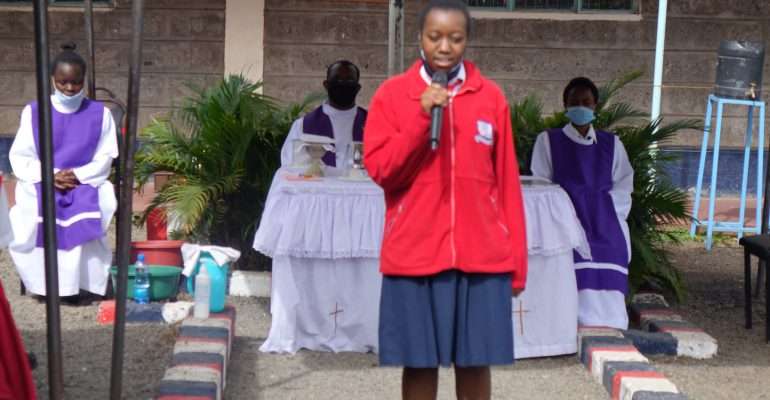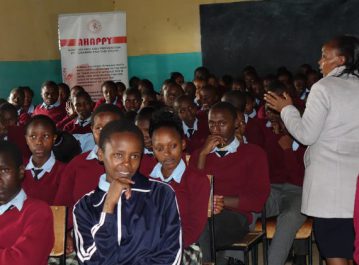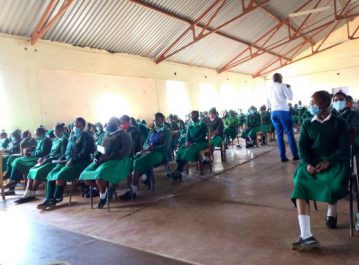Our main programme is the AJAN HIV and AIDS Prevention Program (AHAPPY) which designed to empower the youth with knowledge about HIV and AIDS in Africa. It is aimed at reducing vulnerability and contraction of HIV by the youth. Through it, AJAN works to promote their growth holistically for the achievement of their fullest potential. It helps them avert the devastation caused by HIV and AIDS in Africa by bringing them aboard as accomplished soldiers in the fight against the scourge. Encouraging youth to get tested for HIV enables them to know their status but the programme also seeks to strengthen them take responsibility of their own lives through informed decisions such as sexual abstinence and use of ARV drugs for those who may be already infected besides being agents of positive change.
SHAPE A FUTURE

SHAPE A FUTURE
WHAT IS AJAN HIV AND AIDS PREVENTION PROGRAM (AHAPPY)

OVERVIEW
The vision of AHAPPY is an African youth, freed from disordered tendencies, who live and grow at the best of their ability, without HIV & AIDS, and who work for the good of others and improvement of their continent.
The mission of AHAPPY is to empower young people to make informed and responsible choices to lead a blossoming and successful life and to belong to an AIDS-free generation.
Programme’s Overall Aim
AHAPPY aims to drastically reduce the incidence of HIV infection (as well as STIs and out-of-wedlock pregnancy) among the youth attending Jesuit educational institutions in Africa. It focuses on reducing the incidence of premarital sexual activity and other risky behaviours by promoting balanced human growth and healthy lifestyles. It aims to motivate and equip young people with knowledge, life skills and values to make healthy choices in all aspects of their lives.
PROGRAMME SPECIFIC OBJECTIVES
AHAPPY pursues the following objectives:
- To provide accurate information and knowledge about topics related to human development, sexuality, HIV/AIDS and other areas young people may be curious about;
- To educate young people and provide them with life skills, abilities in critical thinking and correct values;
- To empower young people to resist negative peer-pressure and to assume the responsibility of promoting a healthy environment for themselves and others;
- To encourage and assist youth in reducing their vulnerability to HIV infection, alcohol, drugs, etc., and in developing their talents for better living;
- To empower them to lead successful lives and to support their communities.

PROGRAMME TARGET GROUPS
Our primary target group to which we administer Training of Learners course (ToL) is young people aged 10 to 24, divided into three main groups:
- Ages 10 to 14,
- Ages 15 to 19,
- Ages 20 to 24.
We have a secondary target group who are the adults who interact with young people: teachers, parents, and other community members. These are trained to be Trainers in our Training of Trainers (ToT) Programme.
PROGRAMME LOCATION
AHAPPY is a regional programme to be implemented in sub-Saharan Africa within eight Jesuit provinces of Africa. The major sites are all Jesuit educational institutions and HIV/AIDS projects. Currently the provinces are; Central Africa ACE (Kisangani, Kikwit), East Africa AOR (Kenya, Tanzania, Uganda, South- Sudan), Madagascar (Madagascar), Zimbabwe-Mozambique ZIM (Zimbabwe), North-West Africa ANW (Liberia), Rwanda-Burundi RWB (Burundi and Rwanda), West Africa AOC (Togo, Chad, Central African Republic, Benin, Burkina Faso)
PROGRAMME COMPONENTS
AHAPPY consists of five major components:
- Training and courses (lessons),
- Capacity-building workshops (life skills and values) and peer education,
- Youth Against AIDS clubs,
- Activities attractive to youth (camps, contests, plays, sports, etc.),
- Research on youth behavior and evaluation/monitoring.
Other key interventions include recollections or retreats, conferences and parents-children bridge workshop
